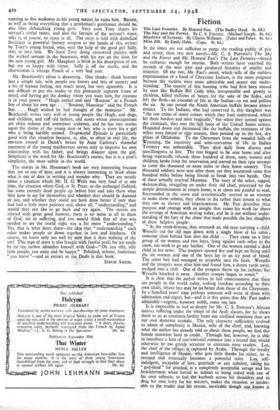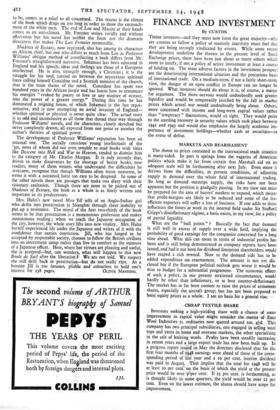Fiction
Iv the times are not sufficient to purge the reading public of pity and terror, then two new novels—Mr. C. S. Forester's The Sky and the Forest and Mr. Howard Fait's The Last Frontier—should be catharsis enOugh for anyone." Both writers have searched the records of the near past and produced histories of cruelty and injustice. • Of the two, Mr. Fast's novel, which tells of the ruthless extermination of a band of Cheyenne Indians, is the more poignant bemuse the victims were more admirable and nearer our under- standing. The enmity of this hunting tribe had first been roused by men like Buffalo Bill Cody who, irresponsible and greedy as children, killed millions of beasts for the sake of the hides,-, and left the flesh—an essential of life to the Indian—to rot and pollute the air. At one period the North American buffalo became almost extinct. To the Indians, who had conserved it, this slaughter was "the one crime of many crimes which they least understood, which hit them hardest and most tragically," but when they turned against the criminals, they met the full force of the United States armies. Hounded down and decimated like the buffalo, the remnants of the tribes were forced to sign treaties, then penned up in the hot, .dry plains of Oklahdma. To the Cheyennes from the wooded hills of Wyoming, the inactivity and semi-starvation of life in Indian Territory was unbearable. They died daily from disease and unwillingness to live. The rest begged to be sent home and after being repeatedly refused, three hundred of them, men, women and children, broke from the reservation and started on their epic attempt to cover the thousand or more miles to their home country. Ten thousand soldiers were sent after them yet they journeyed some five hundred miles before being forced to break into two bands. One of these actually reached Montana. The story of the other, ragged, skeleton-thin, struggling on under their old chief, possessed by the simple determination to return home, is at times too painful to read. Surrounded in the snow and systematically starved in an attempt to make them submit, they chose to die rather than return to what they saw as slavery and imprisonment. Mr. Fast describes their purpose and courage with an insight that raises his work far abnye the average of American writing today, and he is not without under- standing of the fury of the chase that made possible the last slaughter of these helpless people : "At the creek-bottom, they overtook an old man carrying a child. Wessells cut the old man .down with a single blow of his sabre ; someone close behind him shot the child . . • They came on a little group of six women and two boys, lying against each other in the snow, too weak to go any further. One of the women carried a dead child in her arms. The troopera opened fire and kept on firing until the Six women and one of the boys lay in an icy pool of blood. The other boy had managed to scramble into the bush. Wessells and the troopers went after hini'and found him, a dozen yards away, wedged into a cleft. One of the troopers threw up his carbine,' but Wessells knocked it away. Another trooper began to vomit." . It is clear that the author writes in full consciousness that there are people in the world today, seeking freedom according to their own ideals whose fate rimy be no better than those of the Cheyennes. In a hundred years' time perhaps someone will write of them with -admiration and regret, but—and it is this point that Mr. Fast makes- admirably—regrets, however -noble, come too late.
It is impossible to feel so deeply for Mr. C. S. Forester's African natives suffering.mider the whips of the Arab_ slavers, for he shews them to us as creatiires1 farther from our civilised emotions than are our own domestic animals.. The only character sufficiently evolved to admit of complexity is Musini; wife of- the chief, arid, knowing what the author has already: told. us about these people, ":we find this female mutation hard to credit_ Through herr however, he is able to introduce a hint of convention-al romance into a record that wbuld otherwise be too grimly accurate to entertain most readers. Loa, the chief of the village, is -captured by ,Arabs. Through the loyalty and intelligence of Musini, who gets little thanks for either, he is rescued and eventually becomes a powerful ruler. Loa self- indulgent, incapable of love, gratitude or any subtlety, taking his " god-head " for granted, is a completely acceptable savage and his bewilderment when forced to submit to being yoked with one of his own subjects, to feel the kurbash across his shoulders and to drag his own ivory for his masters, makes the situation so intoler- able to the reader that his rescue, inevitable though one knows it to be, comes as a relief to all concerned. The rescue is the climax of the book which drags on too long in order to show the encroach- ment of the white men. The end of Loa and .Musini at their hands comes as an anti-climax. Mr. Forester writes vividly and without affectation but his novel has neither the form nor the dramatic directness that makes The Last Frontier memorable.
Shadows of Ecstasy, now reprinted, also has among its characters an African chief, but one who differs as much from Loa as Professor Williams' oblique method of consducting a book differs from Mr. Forester's straightforward narrative. Inkamasi has been educated in England and his speech, ideas and feelings are those of a European intellectual. He is also, strangely enough, a Christian ; it is the struggle for his soul, carried on between the mysterious spiritual force calling himself Considine and a Scottish minister of the church, that is the main theme of the novel. Considine has spent two hundred years in the African jungle and has learnt how to transmute; his energies "evoked by poetry or love or any manner of ecstasy, into the power of a greater energy." During this time he has dominated a reigning house, of which Inkamasi is the last repre- sentative, and is now attempting an aerial invasion of England— whether spiritual or physical is never quite clear. The actual story is as odd and inconclusive as all those that thread their way through Professor Williams' novels, and the characters, clearly sketched but never completely drawn, all 'expound from one point or another the author's theories of spiritual power.
The development of Professor Williams' reputation has been an unusual one. The socially conscious young intellectuals of the '30s, most of whom did not even trouble to read books with titles like Descent into Hell and War in Heaven, tended to dismiss him to the category of Mr. Charles Morgan. It is only recently that, driven to make discoveries by the shortage of better books, new readers, many of them writers who understand the difficulties he avercame, recognise that though Williams often wrote nonsense, he wrote it with a sustained force too rare to be despised. In some of the other novels there are passages that make one .dizzy with their visionary exaltation. Though there are none to be picked out of Shadows of Ecstasy, the book as a whole is as finely written and important as its predecessors.
Mrs. Hahn's new novel Miss 7111 tells of an Anglo-Indian girl who drifts into prostitution in Shanghai through sheer inability to put up a resistance. The moral of the first two-thirds of the book seems to be that prostitution is a monotonous profession and makes monotonous reading ; when we reach the Japanese occupation of the city, however, the whole story lifts into new vitality., Mrs. Hahn herself experienced life under the Japanese and writes of it with the confidence that carries conviction. Jill, who has longed to be accepted by respectable society, chooses to follow the British civilians into an internment camp rather than live in comfort as the mistress of a Japanese officer. Here, where her virtues are pleasing and useful, she is accepted—but, one wonders, what will happen to this new Boule de Suif after the liberation ? We are not told. We suspect she will drift back to prostitution—but do not really care. As a heroine Jill is too fatuous, pliable and colourless to hold one's



































 Previous page
Previous page